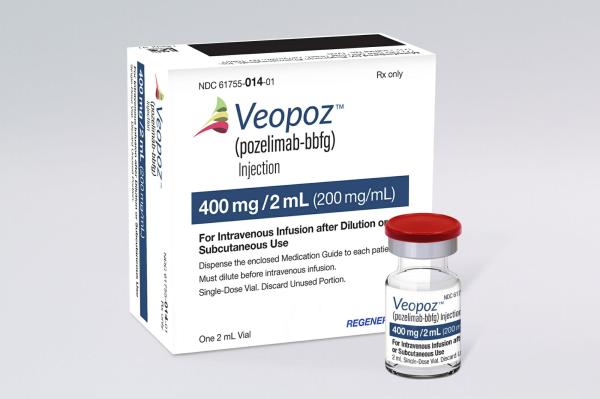Pozelimab Side Effects
Medically reviewed by Drugs.com. Last updated on Nov 10, 2024.
Applies to pozelimab: parenteral injection for iv or sub-q use.
Important warnings
This medicine can cause some serious health issues
-
Serious Meningococcal Infections
- Life-threatening and fatal meningococcal infections reported in patients treated with complement inhibitors; such infections can become rapidly life-threatening or fatal if not recognized and treated early.1
- Complete or update meningococcal vaccinations ≥2 weeks prior to administering first dose of pozelimab-bbfg, unless risks of delaying therapy outweigh those of developing meningococcal infection.1 Follow the most current Advisory Committee on Immunization Practices (ACIP) recommendations for meningococcal vaccination in patients receiving a complement inhibitor.1
- Patients receiving pozelimab-bbfg at increased risk for invasive disease due to Neisseria meningitidis, even if they develop antibodies following vaccination.1
- Monitor patients for early signs of meningococcal infections; evaluate immediately if infection suspected.1
Side effects include:
Adverse effects reported in ≥2 patients include upper respiratory tract infection, fracture, urticaria, alopecia.
See also:
For healthcare professionals
Applies to pozelimab: injectable solution.
General adverse events
Most common adverse reactions were upper respiratory tract infection, fracture, urticaria, and alopecia.[Ref]
Cardiovascular
- Frequency not reported: Elevated systolic blood pressure, elevated diastolic blood pressure[Ref]
Dermatologic
- Very common (10% or more): Urticaria (20%), alopecia (20%)[Ref]
Gastrointestinal
- Frequency not reported: Gingival bleeding[Ref]
Hypersensitivity
- Frequency not reported: Systemic hypersensitivity reactions, immune complex formation[Ref]
Local
- Frequency not reported: Injection site reactions (included dermatitis and erythema)[Ref]
Metabolic
- Frequency not reported: Metabolic acidosis, increased blood uric acid[Ref]
Musculoskeletal
- Very common (10% or more): Fracture (30%)[Ref]
Nervous system
- Frequency not reported: Serious meningococcal infections[Ref]
Other
- Frequency not reported: Bacterial infections[Ref]
Respiratory
- Very common (10% or more): Upper respiratory tract infection (30%)[Ref]
Genitourinary
Hepatic
- Frequency not reported: Increased liver enzymes[Ref]
References
1. (2023) "Product Information. Veopoz (pozelimab)." Regeneron Pharmaceuticals Inc
More about pozelimab
- Check interactions
- Compare alternatives
- Dosage information
- During pregnancy
- Drug class: selective immunosuppressants
- Breastfeeding
- En español
Patient resources
Other brands
Professional resources
Other brands
Related treatment guides
Further information
Pozelimab side effects can vary depending on the individual. Always consult your healthcare provider to ensure the information displayed on this page applies to your personal circumstances.
Note: Medication side effects may be underreported. If you are experiencing side effects that are not listed, submit a report to the FDA by following this guide.

